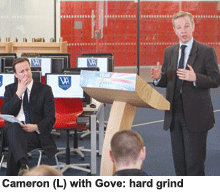With the incumbent Labour party trailing in the opinion polls, experiencing severe demoralisation, the opposition Conservative (Tory) party is set to sweep the general election scheduled for June this year. Against this backdrop, in early March, shadow schools minister Michael Gove spelt out his party’s wide-ranging plans for a radical overhaul of the curriculum and examinations of Britain’s schools.
The Conservatives propose to undertake a complete “reconstruction” of the curriculum if they come to power after the general election, while restating their intention to allow universities to take control of A-levels (Plus Two). Gove says the Conservatives will launch an immediate review of the curriculum focusing on the core subjects of English, maths and science that will require the “full engagement” of “learned societies”. Reforms to history and geography would follow later.
 Speaking at the Royal Society, Gove referred to the Walport report on science and maths education, which claims there is “widespread concern” about the curriculum, while adding that studies by the universities of Coventry and Durham have shown that A-levels have become easier. “(This) work has shown that it is easier to secure good pass marks at A-level now than a generation ago, with papers which would have barely secured a pass being awarded top marks. Private schools are abandoning class X GCSE (General Certificate of Secondary Education) for the IGCSE (International GCSE) because of what one headmaster has called a ‘terrifying’ absence of real science,” says Gove.
Speaking at the Royal Society, Gove referred to the Walport report on science and maths education, which claims there is “widespread concern” about the curriculum, while adding that studies by the universities of Coventry and Durham have shown that A-levels have become easier. “(This) work has shown that it is easier to secure good pass marks at A-level now than a generation ago, with papers which would have barely secured a pass being awarded top marks. Private schools are abandoning class X GCSE (General Certificate of Secondary Education) for the IGCSE (International GCSE) because of what one headmaster has called a ‘terrifying’ absence of real science,” says Gove.
According to Gove, the Royal Society of Chemistry has attacked changes to the maths and science GCSE as a “catastrophe” and Sir Mark Walport is clear about the need to enhance rigorous subject knowledge, and especially mathematical content in the whole science curriculum. In response to this, Gove says, the Conservatives would launch a complete overhaul of the curriculum that will be in place by September 2011.
The reforms will define what knowledge a pupil should have at the ages of seven, 11, 14, 16 and 18, he says. Once in place, the curriculum would be given time to “bed down” without “constant rewriting” and political “meddling”. According to a source close to Gove, the Conservatives are looking at models abroad, such as in the Netherlands, which reviews its curriculum every 10 years.
The Tories’ plans for “profound change” also stretch into the primary sector — the Rose Review will be scrapped as it diminishes the place of maths, and key stage 2 tests would include the likes of geometry and algebra. Universities will be given more power over A-levels, forcing them to be more honest about which qualifications they prefer, while handing them question-setting powers along with exam boards and other learned societies.
The proposals have won praise from certain corners, particularly the Cambridge assessment exam board, which says it believes “education should not be hindered by unnecessary regulation or political interference”.
(Excerpted and adapted from Times Higher Education)